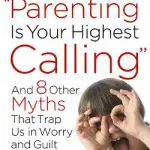I have been sent so many books to read lately that I’m breaking down my “What’s On My Nightstand” posts into two segments this month. (The next one will be on Tuesday 2/24.) Today, I’ll be reviewing Scream Free Parenting by Hal Runkel and Parenting is Your Highest Calling and 8 Other Myths That Trap Us in Worry & Guilt by Leslie Leyland Fields.
Scream Free Parenting by Hal Runkel

Right now, my husband and I are focusing on the way we speak in our home. We don’t have big arguments or call each other or the kids mean names or anything like that. Rather, I raise my voice when I get excited (in a positive or negative) way. I can also have an annoyed tone when I don’t feel like being bothered. As we all know, it’s not just what we say, but how we say it. We’ve figured out a fun way to help us both grow in the way we speak. We have to pay a quarter each time that we speak in an unloving manner. A quarter doesn’t seem like much, but we’re both very competitive people by nature…neither one of us want to be on “the list”. (In addition to the quarter, we keep a sheet with the reason why the person had to give the quarter.) It has really helped me to see my “patterns”. Overall, I tend to lose my cool when I don’t feel like my husband or kids are acting “appropriate” to the situation. For me, knowing that helps me to choose my reaction better when such situations arise. We have this running joke (based on The Incredible Hulk movie) where we chart the number of days since our last (speech violation)”incident”. I’m happy to say that’s it been a few weeks since my last “incident”. I really believe that what you focus on changes!
It’s interesting that I was sent the Scream Free Parenting book after we had started our own little family system. It’s a really great resource. The first part focuses on parents dealing with their own issues so that they can control themselves/calm themselves down. In essence, parents are called to grow up and be the calming authority in their homes. The second part focuses on creating boundaries and space for everyone (adults and kids!). It encourages parents to have a mental image of what they’d like to see happen while simultaneously not getting caught up in the results aspect of the vision. It also talks about the importance of kids having their own separate space (not necessarily physical) outside of their parents. I especially like the point that they make in this section about labeling kids. (Be careful!) Part three is about setting the emotional tone of the family’s interactions, letting children experience the consequences of their decisions; and being consistent in disciplining. [The line “empty threats are really broken promises” really resonated for some reason. Although I’m pretty consistent with following through on what I say to my kids, just to think that each time I don’t is really a lie…whoa!)] The last section of the book focuses on parents loving themselves better so that they can love their families better. It’s the shift to a “put on your own oxygen mask first” mentality. Overall, this is a great book with some helpful, practical advice. If applied, I believe that they could help change the relationship dynamics in many families.
Parenting is Your Highest Calling and 8 Other Myths That Trap Us in Worry & Guilt by Leslie Leyland Fields

(Please note that this book has references to faith/God but its themes and topics are of interest to parents/families of all walks of life.)
I really like that this book addresses the guilt and insecurity surrounding parenting that many Christians are reluctant to discuss by sharing about the following 9 parenting myths.
1. Having Children Makes You Happy and Fulfilled (Not necessarily – that’s not their purpose in our lives.)
2. Nurturing Your Children is Natural and Instinctive (Not always – many times it’s a hard choice!)
3. Parenting Is Your Highest Calling (It is not. Our relationship with God is our highest calling.)
4. Good Parenting Leads to Happy Children (No one is happy all of the time. Don’t confuse your hopes for your children with hopes for yourself!)
5. If You Find Parenting Difficult, You Must Not Be Following the Right Plan (Not necessarily – there is no perfect plan/formula. You have to rely on God)
6. You Represent Jesus to Your Children (We can’t be Jesus. We can only need Him.)
7. You Will Always Feel Unconditional Love for Your Children (Not! Love causes a range of emotions)
8. Successful Parents Produce Godly Children (God is in control. Don’t make it so much about ourselves.)
9. God Approves of Only One Family Design (There are no “perfect” families on earth.)